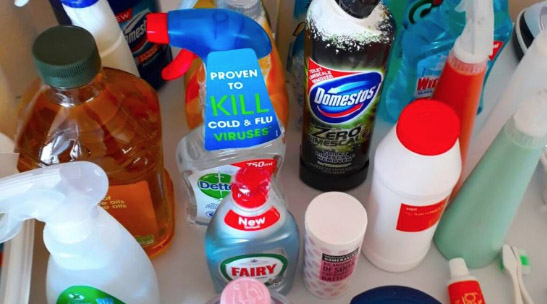Housekeepers will typically use a form of chemical in their daily routine. Different properties and hotels may choose to use certain brands or products, some more harsh than others, but at the heart of these products (even natural products such as bicarbonate of soda), there are chemical reactions occurring in order to achieve a clean result.
It is vital that a housekeeper understands the correct etiquette when dealing with chemicals to ensure that they protect the surfaces and the product they are cleaning, but also to ensure that they are safe and protected.
So what type of housekeeping cleaning chemical training should you be looking to undertake? What concerns should you be looking for?
What are the chemical concerns for the housekeeper?
Some cleaning chemicals can cause serious health risks. They can include:
- Fumes release by the chemical
- Reactions with water, and if not correctly diluted or mixed dangerous reactions
- Skin/Eye/Body irritation
- Risk to Children and pets.
Cleaning products can cause health problems if they are not used and stored correctly. It is vital that your housekeeper has the correct training to ensure that you are not liable for any accidents, and also so that their health and your family or guests health is protected.
You should also consider the ventilation in an area that a cleaning product is being used, and if splashes or spills occurs how they are dealt with. Ideally you should have a clear protocol for accidents or when chemicals come into contact with the skin.
Remember not all chemicals are in liquid form, and vapour given off by a chemical can be a deadly gas.
What are the tips the housekeeper can apply to reduce the effect of these chemicals?
You should have a clear safe work practice and guide for your housekeeper in your home or hotel. These should include:
- Regular training and updated protocols on correct chemical usage for the products used
- Clear dilution and ratio of chemical to water etc, so that the housekeeper knows the correct mixing ratio
- Understanding of what to do with accidents or emergencies
- Chemicals and cleaning products should have clear labels, including home made products.
- They should be stored out of reach of children and pets
- Ventilation should be encourage and if not possible then face masks and regular breaks taken.
- Reminding housekeeper to regularly wash their hands so that no chemicals can be transferred to the face or other surfaces
Why should the housekeeper take a cleaning chemical training course?
By undertaking a specialist housekeeping course, which covers chemical training, it will allow your housekeeper to be fully trained and confident, and also reduce liability from your side should an accident happen.
A good training course should include all types of chemicals and cleaning products and review and implement from start the finish of the procedures when using them.
It will give your housekeeper confident and the ability to protect themselves and also get the best results in the clean. Ultimately producing the best results for the room/subject they are cleaning, for a spotless result!
A good training should cover:
- Health and Safety of chemical handling
- Handling, storage and dilution protocols
- Procedures to follow when a spill occurs
- Personal protection equipment
- Correct labelling of products
- Never mixing chemicals incase of dangerous reactions
Why should you choose Polo & Tweed?
Polo & Tweed are experienced housekeeper trainers. We have specialist trainers who are experienced with cleaning chemical training and this is taught in both our group and private training.
If you decide you need bespoke advice, we can create a tailor-made package to suit your specific needs, and our trainers can train your housekeeper(s) in situ.
Ultimately the buck stops with you, the employer, so make sure your housekeeper has the correct chemical cleaning training and protect your staff and your own liability.
Why not get in touch with us today to discuss about how we can help with your training needs.

